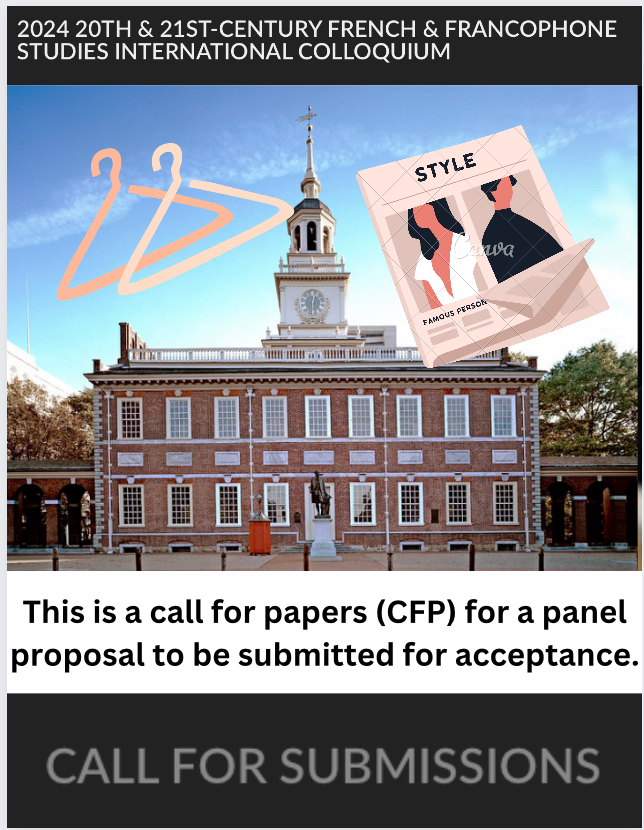
20th & 21st Century French and Francophone International Colloquium : Fashion Panel Proposal (Philadelphie)
This is a call for papers (CFP) for a panel proposal to be submitted for consideration.
20th & 21st-Century French & Francophone Studies International Colloquium
“Independence”
Thursday, February 22 to Saturday, February 24, 2024
Villanova University | Philadelphia, PA, USA
Panel Title: Fashion & (In)Dependence
Panel Chair: Dr. Marylaura Papalas, East Carolina University
Detractors of fashion abound. Bourdieu Pierre and Delsaut Yvette in their 1975 essay “Le couturier et sa griffe : contribution à une théorie de la magie,” draw parallels between haute couture and haute culture, arguing that in order to exist and dominate, both rely on the subjugation and work of the lower classes. The fashion industry’s role in fueling disparities within capitalist and globalized economies is also a topic addressed by Theodor Adorno, Max Horkheimer, Jürgen Habermas, and Guy Debord. While these reproaches are legitimate and while the industry needs to address and rectify these problems, other theorists see a more nuanced picture. In addition to being a function of oppressive social structures, the act of dressing, according to sociologist Georg Simmel, can also be a response to creative individual impulses. Gilles Lipovetsky goes even furth and draws a link between fashion and successful democracies. In his 1987 book L’empire de l’ephémère: la mode et son destin dans les sociétés modernes, the French philosopher argues that dress and style are important expressions of fantasy, subjectivity, and autonomy, all of which can lead to a healthy questioning of the public sphere. “La Mode… est l’agent suprême de la dynamique individualiste dans ses diverses manifestations.”*
Echoing the cacophony of voices concerning la mode, this panel seeks papers that investigate fashion as a path toward freedom, a tool for oppression, and anything in between. Do fashion, dress and style help protagonists achieve independence and autonomy, or are they an indication of dependency on established norms and systems? What roles does fashion take on as fictional characters and non-fictional actors seek to find stability in the surrounding world or recover self-confidence? What happens to fashion during times of change, insurrection and rebellion? This panel welcomes papers devoted to fashion as a manifestation of liberty or as a sign of dependency. It seeks papers on both textual and graphic representations of fashion, and encourages submissions that examine sartorial themes in literature, music, theater, art, film, photography, bande dessinée, periodicals, digital media, and other aesthetic modes of expression.
*page 20 of Gilles Lipovetsky’s L’Empire de l’Ephémère ; la mode et son destin dans les sociétés modernes, Gallimard, 1987.
Topics of interest include, but are not limited, to the following:
· Fashion as resistance/empowerment/liberation.
· Fashion as enslavement/oppression/control.
· Individual and/vs. group expression through dress.
· Fashion as an expression of gender/age/sex.
· Fashion’s role in social and political revolutions and its relationship with independence.
· Fashion as a means of engaging unique mode of communication.
· Fashion’s intersections with the natural or urban environment.
· Close readings of French and francophone fashion pieces and collections in the Costume & Textiles collection of the Philadelphia Museum of Art.
By September 10, 2023, please send abstracts of 250-500 words along with AV requests and short bio to Marylaura Papalas, East Carolina University, at papalasM@ecu.edu.